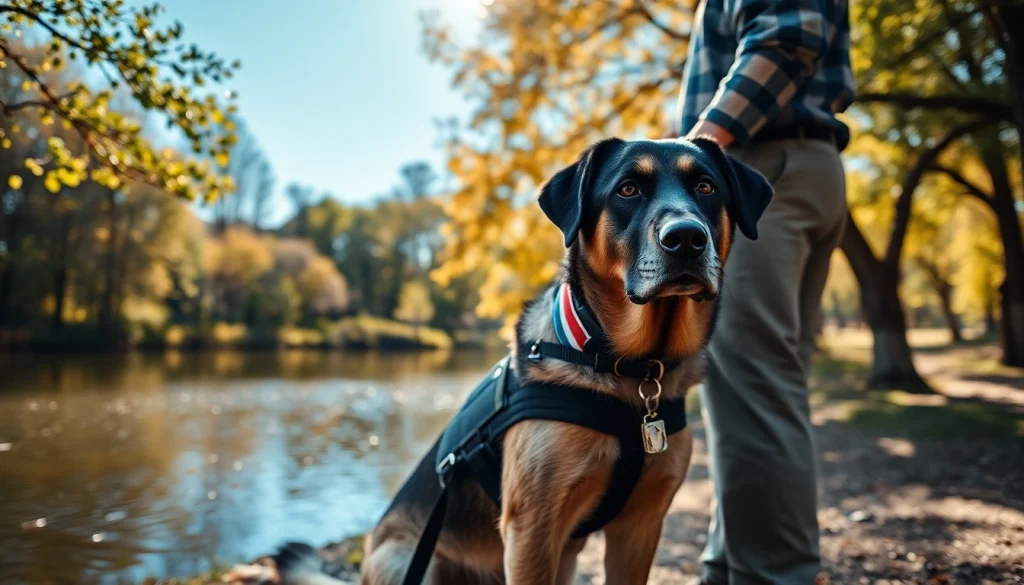Understanding PTSD and the Role of Service Dogs
What is PTSD?
Post-Traumatic Stress Disorder (PTSD) is a mental health condition triggered by experiencing or witnessing a traumatic event. Symptoms may vary widely and affect individuals differently. Common signs of PTSD can include flashbacks, severe anxiety, nightmares, and uncontrollable thoughts about the event. According to recent studies, those affected by PTSD often find it challenging to return to their normal routines, impacting their relationships, work, and overall quality of life. It is essential for individuals experiencing PTSD to seek appropriate help, which can sometimes include the companionship of trained service animals.
How Service Dogs Help with PTSD
PTSD service dogs serve as a vital presence for their handlers. The connection formed between the individual and their service dog can foster a sense of safety and emotional support, which is crucial for coping with anxiety and fear related to PTSD. Service dogs can also assist with grounding by providing physical comfort or helping to redirect panic attacks before they escalate.
Types of Tasks Trained Service Dogs Perform
Trained PTSD service dogs perform a variety of tasks tailored to their handler’s specific needs, including:
- Deep Pressure Therapy: The dog may apply pressure with their body weight during anxiety episodes, providing calming effects.
- Alerting and Comforting: Service dogs can alert their owners to signs of panic or anxiety, helping them transition into a more secure mental space.
- Providing Physical Presence: A service dog can create a physical barrier between their handler and crowds or unknown individuals, reducing feelings of vulnerability.
- Behavior Disruption: When a panic attack occurs, a service dog can interrupt the cycle of anxiety, allowing the individual to refocus.
Characteristics to Look for in a PTSD Service Dog
Temperament and Personality Traits
When selecting a PTSD service dog, the character of the dog is of utmost importance. Ideal traits include:
- Calm: The right service dog should remain composed in stressful situations.
- Empathetic: An ability to sense the handler’s emotional state can enhance the bond and effectiveness of the service dog’s support.
- Trainable: A dog that is eager to learn and work well with its handler is essential for suitable task performance.
Training and Skill Sets
Service dogs undergo extensive training to perform necessary tasks. This training often spans months and involves a variety of commands, socialization experiences, and practice scenarios to ensure dogs can handle unexpected situations with their handlers. A well-trained service dog will be responsive to commands and demonstrate appropriate behaviors in diverse environments.
Choosing the Right Breed
While various breeds can be trained as service dogs, certain breeds are commonly preferred for their temperament and size. Breeds such as Labrador Retrievers, Golden Retrievers, and German Shepherds tend to embody the characteristics needed for service work, including loyalty, intelligence, and the ability to bond closely with their handler.
Where to Find PTSD Service Dogs for Sale
Reputable Breeders and Organizations
When searching for a PTSD service dog for sale, it is crucial to seek out reputable breeders and organizations. Look for those that are accredited by recognized service dog training programs, as they adhere to specific standards and ethical guidelines in their breeding and training practices.
Adoption vs. Purchase: Pros and Cons
Both adoption and purchasing a trained service dog have their advantages and disadvantages:
- Adoption: This option often has lower costs, and by adopting, individuals may offer a home to a dog in need. However, finding a dog already trained for service can be more challenging.
- Purchase: While typically more expensive, buying a fully trained service dog ensures that the dog has the specific skills needed to assist with PTSD.
What to Expect During the Adoption Process
The adoption process can vary based on the organization or shelter. Potential handlers should expect an application process that might include interviews and assessments. Education about the specific needs of a PTSD service dog, as well as home training, will be paramount to successfully integrating a dog into their new environment.
Financing Your PTSD Service Dog
Costs Involved in Service Dog Ownership
Owning a PTSD service dog comes with various financial responsibilities. Initial costs can include purchasing or adopting the dog, paying for training, and vet bills. Estimates suggest that the total annual cost for maintaining a service dog ranges from $1,000 to $2,000, which encompasses food, supplies, routine veterinary care, and potential emergencies.
Funding Options and Grants
For those seeking financial assistance, several options may be available, including grants specifically for service dog training and placement. Nonprofit organizations may offer funding or scheduling that provides subsidized training programs. Additionally, working with your healthcare provider may yield recommendations for financial resources.
Veterans’ Benefits and Resources
Veterans with PTSD may qualify for specific benefits that can assist in covering the cost of a service dog. Several organizations offer service dogs to veterans at no cost, and it is advisable for veterans to explore VA resources, which may include financial assistance and other supportive measures.
Supporting a Successful Transition with Your PTSD Service Dog
Training Together: Building a Strong Bond
Once you bring a service dog into your life, investing time into training together is vital. Joint training not only equips the dog to respond to commands efficiently but also strengthens the emotional connection between the handler and the dog. It is beneficial to participate in training sessions led by professionals to ensure consistency and proper techniques.
Routine Care and Maintenance
Daily routine care significantly influences the well-being of a service dog. This includes regular exercise, quality nutrition, and routine veterinary care. Establishing a structured daily routine enhances not only the dog’s quality of life but also increases the chances of a favorable outcome in dealing with PTSD-related challenges.
Continued Support Resources
As you and your service dog embark on this journey together, ongoing support is essential. Resources such as peer support groups, mental health professionals who specialize in PTSD, and service dog training organizations can offer guidance and reassurance. These resources help maintain training and bond between the handler and their canine companion.


